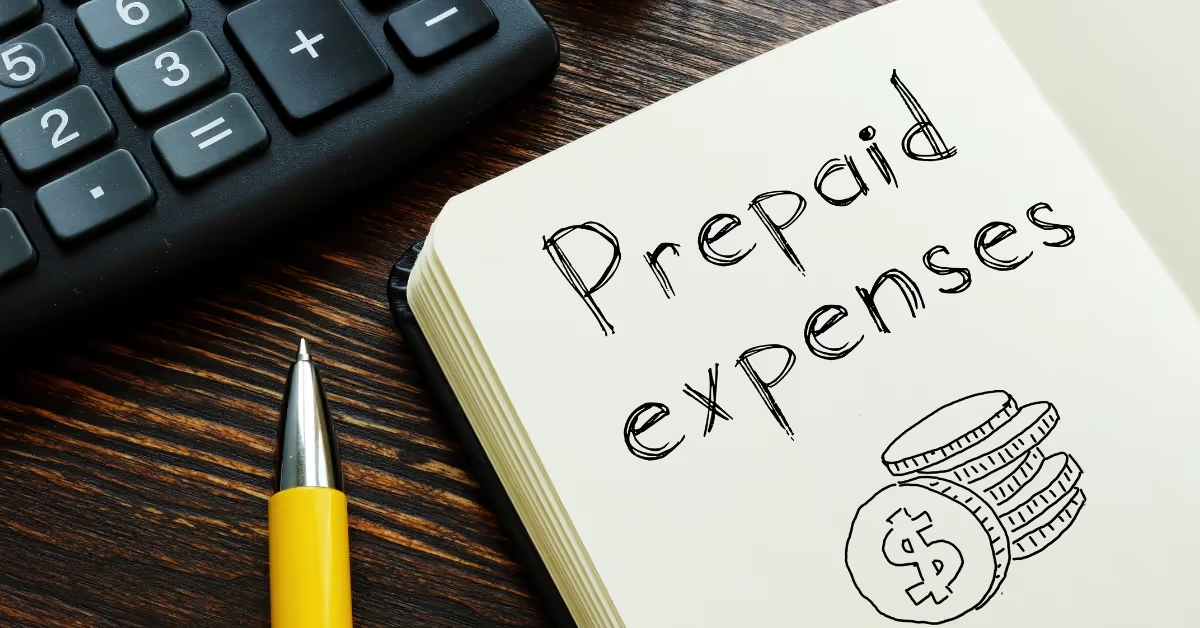Prepaid expenses: Definition, examples, and basics
This post delves into prepaid expenses, providing a clear understanding of their mechanisms, significance, benefits, potential drawbacks, and alternatives.

By accounting for prepaid goods and services to be consumed or utilized over multiple accounting periods, organizations can streamline their accounting practices, improve financial visibility, and facilitate better decision-making.
This post delves into prepaid expenses, providing a clear understanding of their mechanisms, significance, benefits, potential drawbacks, and even alternative options.
What are prepaid expenses?
Prepaid expenses refer to payments made in advance for goods or services that will be received or consumed. These payments are initially recorded as assets on the balance sheet, since they represent future economic benefits. As time passes and the related goods or services are consumed or used up, the prepaid expense is gradually recognized as an expense on the income statement. Prepaid expenses are a crucial aspect of accounting, helping businesses allocate costs over relevant accounting periods and maintain accurate financial records.
How do prepaid expenses work?
Prepaid expenses function by allowing businesses to make advance payments for goods or services, with the intention of utilizing or consuming them over multiple accounting periods. When a payment is made, the company records it as an asset on the balance sheet, acknowledging its future benefit. As time progresses, the company gradually recognizes these prepaid costs as expenses on the income statement through adjusting entries.
To understand how prepaid expenses work, imagine a scenario where a company pays for an annual software subscription upfront. Instead of recognizing the entire expense in one go, the cost is allocated over the duration of the subscription. Each month, a portion of the prepaid expense is recognized as an expense on the company's financial statements.
Why are prepaid expenses important?
One of their primary benefits is effective cash flow management, achieved by spreading expenses over time. This approach enables businesses to mitigate sudden financial strain and ensures smoother budgeting and forecasting processes. Moreover, prepaid expenses facilitate precise expense matching with revenue, providing a more accurate depiction of the company's financial status.
Cost savings can be achieved through prepaying expenses if businesses receive early payment discounts. This practice not only optimizes financial resources but also enhances overall profitability. Depending on the specific tax regulations in a given jurisdiction, prepaid expenses may offer additional tax benefits.
Benefits of prepaid expenses
The benefits of prepaid expenses are manifold and encompass several aspects of financial management and operational efficiency for businesses. Some of the key advantages include:
- Accurate financial statements: By recognizing expenses over the appropriate period, prepaid expenses ensure accurate financial reporting and better matching of expenses with revenue.
- Budgeting and forecasting: With prepaid expenses, businesses gain better visibility into future financial obligations. This facilitates more informed budgeting and forecasting, empowering organizations to plan for expenses and allocate resources effectively.
- Effective cash flow management: Prepaid expenses allow businesses to spread out costs over time. By making advance payments for goods and services, companies can better manage their cash flow, avoiding sudden financial strains and ensuring sufficient funds for other operational needs.
Downsides to prepaid expenses
Here are potential downsides to prepaid expenses that businesses should be aware of:
- Liquidity concerns: Prepaying expenses ties up cash that could be used for other purposes, potentially affecting liquidity.
- Risk of obsolescence: In certain cases, prepaid assets or services may become obsolete before their intended use, leading to loss or inefficiency.
- Risk of non-performance: There is a risk that the vendor may not fulfill its obligations, leading to the loss of prepaid funds and the need for complex recovery processes.
Journal entries for prepaid expenses
The journal entry to record prepaid expenses typically follows this format:
Expense method
- Debit: Prepaid expense account
- Credit: Cash or accounts payable account
Asset/liability method
- Debit: Prepaid expense liability account
- Credit: Cash or accounts payable account
As the prepaid expense is gradually consumed or utilized, subsequent journal entries will be made to transfer the amount from the prepaid expense account/liability account to the appropriate expense account.
Frequently asked questions
Are prepaid expenses recorded as an asset?
Yes, prepaid expenses are recorded as assets on the balance sheet. They represent future economic benefits that the company has already paid for. The amount paid in advance is classified as a current asset and is reported under the prepaid expense account.
Are prepaid expenses debit or credit?
Prepaid expenses are initially recorded as an asset on the balance sheet, which means they are debited when recorded. When a business makes a prepayment for goods or services, it increases the prepaid expense asset account on the balance sheet, reflecting the future economic benefit. As time passes and the goods or services are consumed or utilized, the prepaid expense is gradually recognized as an expense on the income statement, which is when it is credited.
Can prepaid expenses be converted into cash?
Prepaid expenses, by their nature, involve upfront cash payments. However, their conversion to cash depends on the specific terms of the prepaid arrangement and any applicable refund policies. In some cases, prepaid expenses may be refundable, resulting in a cash return.
How long can prepaid expenses be carried on the balance sheet?
The duration for which prepaid expenses are carried on the balance sheet depends on the specific terms of the prepaid arrangement. Prepaid expenses are typically carried out until they are consumed or utilized, which can vary based on the nature of the prepaid item or service.
Are prepaid expenses tax-deductible?
In general, prepaid expenses are tax deductible if they meet certain criteria. Consult with a tax professional or accountant to ensure proper treatment of prepaid expenses for tax purposes.
How do prepaid expenses impact financial statements?
Prepaid expenses affect financial statements by reducing the reported expenses in the period of payment and increasing the expenses in the periods when they are recognized.
Can prepaid expenses be amortized?
Yes, prepaid expenses can be amortized over the applicable period. This ensures that the expense is recognized proportionately over time rather than all at once. Remember to consult with your accountant or financial advisor for specific guidance on your business's unique circumstances.
Can prepaid expenses be refunded?
In certain cases, prepaid expenses may be refundable. It depends on the terms and conditions agreed upon with the vendor or service provider. If a refund is applicable, the amount can be recorded as a liability until the refund is received.
How do I adjust prepaid expenses at the end of the accounting period?
To adjust prepaid expenses at the end of an accounting period, calculate the portion that has been utilized or consumed. Create a journal entry to transfer the appropriate amount from the prepaid expense account to the relevant expense account, reflecting the expense incurred during that period.
What happens if prepaid expenses expire?
Upon expiration, the prepaid expense is no longer an asset, as the future benefit it represents has now been consumed or utilized. Instead, it becomes an actual expense for the company in that accounting period. This process of allocating the prepaid amount to expense is known as expense recognition or amortization.
What is the impact of prepaid expenses on financial ratios?
Prepaid expenses have an impact on various financial ratios. They can affect liquidity ratios, such as the current ratio, as they represent an asset that may be converted into cash in the near term. Additionally, prepaid expenses can influence profitability ratios, as they affect the timing of expense recognition.
Are prepaid expenses subject to depreciation?
Prepaid expenses are not typically subject to depreciation since they represent future expenses already paid for. Depreciation is primarily associated with tangible assets, such as property, plant, and equipment, rather than prepaid expenses.

